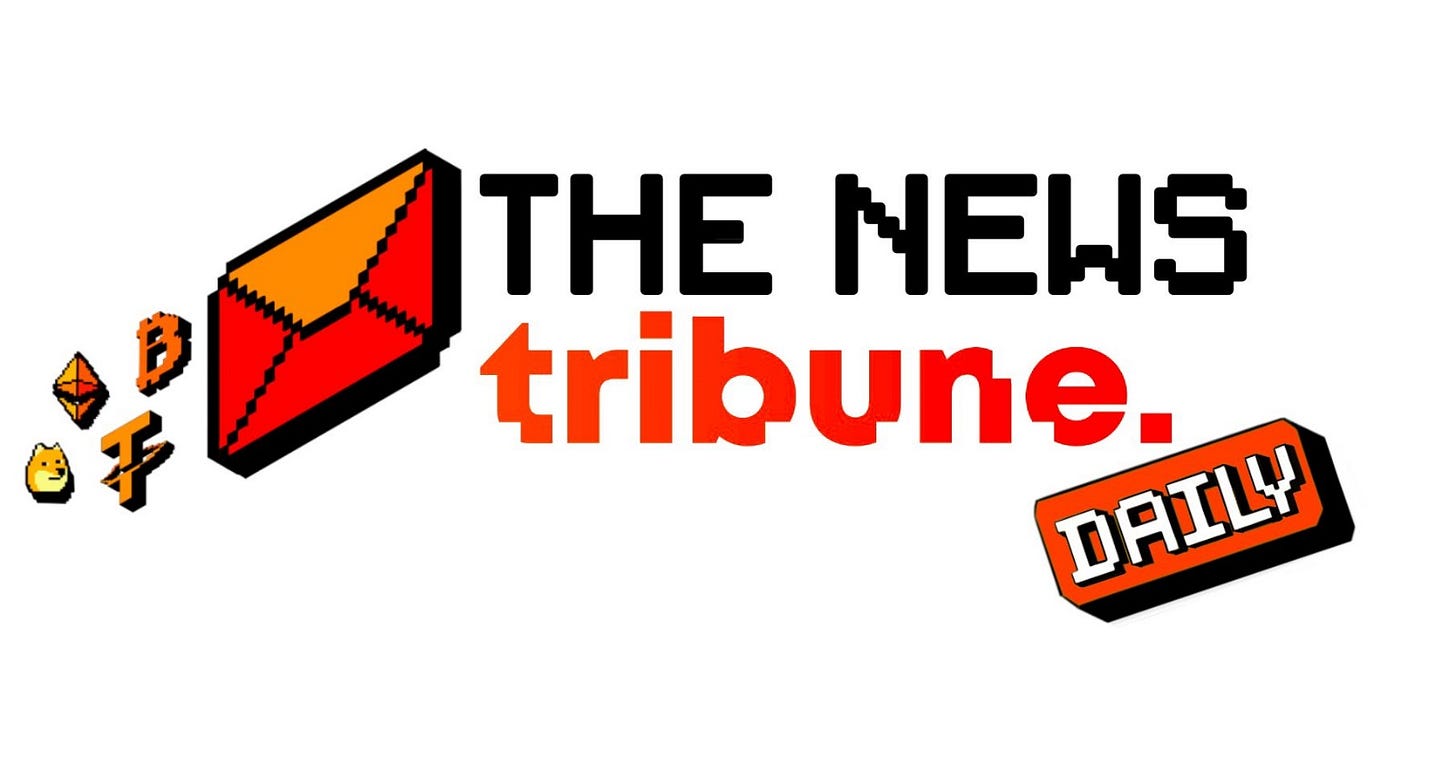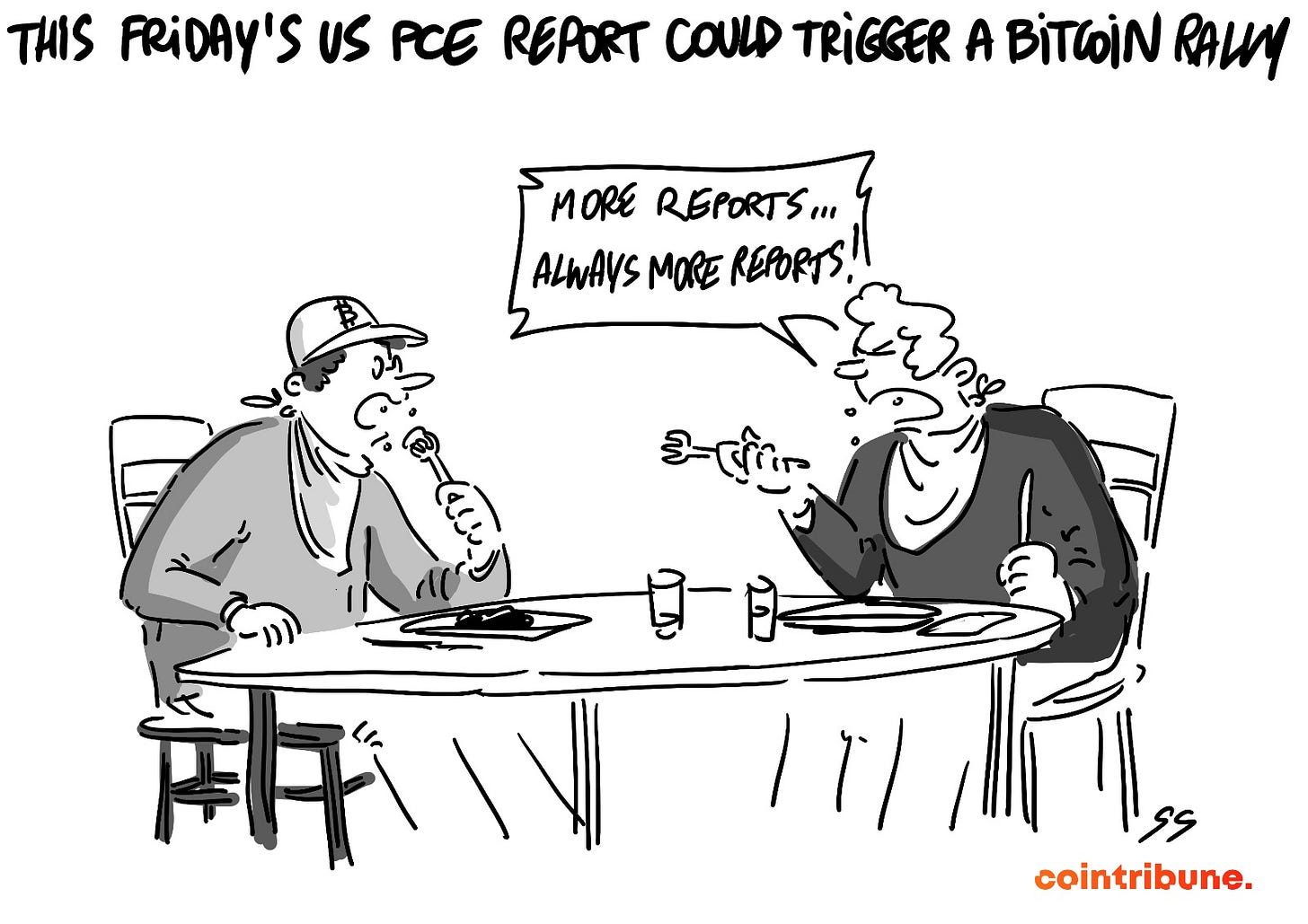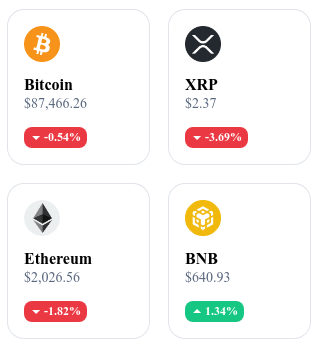Will tomorrow's U.S. PCE report trigger a rally?
Welcome to the Daily Tribune of Thursday, March 27, 2025 ☕️
Happy New Year to Cointribu! 🚀
Today is Thursday, March 27, 2025, and like every day from Tuesday to Saturday, we summarize the news from the last 24 hours that you shouldn't miss!
But first…
✍️ Cartoon of the day:
A quick look at the market…
🌡️ Temperature:
Cloudy ☁️
24h crypto recap! ⏱
The U.S. PCE report this Friday could trigger a Bitcoin rally
The PCE (Personal Consumption Expenditures) report expected this Friday is being closely monitored by crypto investors. This report, a key indicator of inflation in the United States, could trigger a Bitcoin rally if the figures show a decrease in inflation, boosting interest in risk assets. Optimistic forecasts are supported by experts like Arthur Hayes, who envisions a peak at $110,000.
Nubank offers ADA, NEAR, ATOM, and ALGO to its 100 million users
The Brazilian neobank Nubank, backed by Berkshire Hathaway, is integrating four new crypto assets (ADA, NEAR, ATOM, and ALGO) into its portfolio. This decision marks a strategic step towards massive adoption in Latin America, where demand for altcoins is rapidly expanding. With over 100 million users, Nubank positions itself as a key player in the crypto market in Brazil.
The SEC prepares four roundtables on crypto regulation
The SEC is organizing four roundtables on crypto regulation between April and June, addressing topics such as trading, asset custody, tokenization, and DeFi. This initiative reflects a shift towards a more open dialogue, in contrast to the Gensler era. These discussions could lead to a clearer regulatory framework for the crypto industry in the United States.
USDC's market capitalization exceeds $60 billion
USDC, the stablecoin issued by Circle, surpasses the $60 billion mark in market capitalization, becoming the second stablecoin after USDT. This rapid growth is driven by its widespread adoption on blockchains like Ethereum and Solana, as well as regulatory support from MiCA in Europe. Circle's strategic expansion across multiple networks continues to strengthen its position in the global stablecoin market.
Today's crypto: Sui (SUI)
Sui is a layer 1 blockchain designed to offer fast, secure, and low-cost transactions. It stands out for its object-centered data model and the use of the Move programming language, allowing it to process transactions in parallel and significantly improve scalability compared to traditional blockchains. This innovative architecture aims to facilitate the mass adoption of decentralized applications by providing a smooth and efficient user experience.
The native token of the Sui blockchain, SUI, is primarily used to pay transaction fees on the network. SUI holders can also participate in the proof-of-stake mechanism by delegating or staking their tokens, thus contributing to the network's security while earning rewards. Additionally, SUI is used for governance, allowing holders to vote on protocol improvement proposals. The initial distribution of SUI was conducted during the mainnet launch in May 2023, with a total supply capped at 10 billion tokens.
Recent performances:
Current price: $2.78 (approximately €2.58)
24-hour change: +8.73 %
Market capitalization: $8.81 billion
Ranking on CoinMarketCap: #16
Stablecoin USD1: Trump, judge, party, and beneficiary?
Donald Trump has just launched USD1, a stablecoin backed by U.S. public debt via a company called World Liberty Financial (WLFI), 60% owned by his own family. This project has sparked intense controversy, as it places Trump in an unprecedented situation where he is both regulator and beneficiary.
An unprecedented conflict of interest
The idea of an incumbent president launching his own stablecoin shocks the political and financial community. Indeed, USD1, backed by public debt, offers Trump colossal economic power. This project raises concerning questions about democratic integrity: how can a president issue and regulate a financial asset while personally profiting from it?
Critics are particularly concerned about the risk of foreign funding. Through WLFI, any international actor could acquire USD1 and thus potentially influence U.S. policy. Moreover, the controversial crypto entrepreneur Justin Sun would have already injected $75 million into the project, although he is currently under investigation by the SEC.
Economic and ethical repercussions
Trump also wishes to introduce the GENIUS Act, a law to regulate stablecoins, which could lock the market by positioning USD1 as the primary stable currency on American soil. This strategy risks disrupting the global economic balance by monetizing public debt uncontrollably.
Regulators are alarmed. Senator Elizabeth Warren calls for an ethical investigation, denouncing a hostage-taking of the financial market by an incumbent president. Heath Mayo, a political analyst, describes this situation as a "ticking time bomb" and fears a historic financial scandal if USD1 flourishes without strict oversight.
A threat to financial democracy?
USD1 represents much more than a simple stablecoin. It is an unprecedented power tool, where Trump could control both monetary issuance and crypto regulation. In the face of this systemic risk, debate intensifies between proponents of enhanced control and advocates of economic freedom. If USD1 were to thrive, it could redefine U.S. monetary policy… or trigger a financial crisis with unpredictable consequences.









